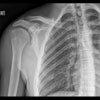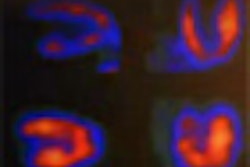VIENNA - SPECT may be useful for the very early detection of Alzheimer's disease, according to research reported at the Alzheimer's Association's 2009 International Conference on Alzheimer's Disease.
In a study of 80 subjects, "reduced regional cerebral blood flow was observed in the posterior cingulated gyrus and parietal regions long before signs of clinical cognitive impairment," said Dr. Kiyotaka Nemoto, an assistant professor in the department of neuropsychiatry at the Graduate School of Comprehensive Human Sciences of the University of Tsukuba in Ibaraki, Japan.
Although several studies have shown that people with mild cognitive impairment experience reductions in regional cerebral blood flow that are similar to those seen in Alzheimer's disease patients, little is known about when these changes occur, Nemoto said.
So the researchers used SPECT to explore differences in regional cerebral blood flow between cognitively intact patients who went on to develop cognitive impairment and those who did not.
The 80 patients were enrolled in an ongoing community-based prospective cohort study and were cognitively normal at baseline. All the subjects underwent MRI to rule out cerebral infarct and technetium-99m-ethyl cysteinate dimer (Tc-99m-ECD) SPECT.
Each SPECT image of the subjects was standardized anatomically, and voxel-by-voxel z-score calculations were performed after voxel normalization to global mean values.
"It's a very simple scoring system. A z-score of 2, for example, means blood flow perfusion is two standard deviations lower than normal," Nemoto said.
Over the next three years, 20 patients suffered cognitive decline. Results showed that the baseline z-scores discriminated between the 20 patients who suffered cognitive decline and the 60 patients who did not, Nemoto said.
The mean z-score value for the cognitively intact group was 0.66, compared with 0.84 for the group that was cognitively normal, he reported. The difference was statistically significant (p = 0.12). In contrast, baseline mini-mental state examination (MMSE) scores were not significantly different between the two groups, he said.
"Reduced perfusion can be seen on SPECT years before there are clinical signs of cognitive impairment or Alzheimer's disease," Nemoto said. "The hope is that SPECT can be used to diagnose Alzheimer's before symptoms develop."
By Charlene Laino
AuntMinnie.com contributing writer
July 14, 2009
Related Reading
Automated MRI measures identify mild cognitive impairment and Alzheimer's disease, June 22, 2009
MRI, PiB-PET may help distinguish dementias, May 4, 2009
Brain scans spot changes linked to Alzheimer's, March 17, 2009
MRI shows brain atrophy to predict Alzheimer's, February 11, 2009
UCLA study finds PET with FDDNP radiotracer can predict Alzheimer's, January 13, 2009
Copyright © 2009 AuntMinnie.com

















